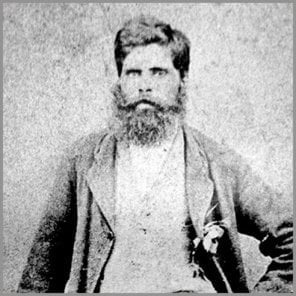
- Inducted:
- 2015
Following in the footsteps of his Wurundjeri elders, Simon Wonga and William Barak, historic Aboriginal leader Robert Wandin (also known as Wandoon) fought to make a better life for his people.
Early years
Robert Wandin was the son of Borat, William Barak's sister. He was born in the Stee's Flat area of the Upper Yarra but there are conflicting stories about his infant years.
One such story is that he was rescued from drowning in the Wandin Yallock Creek by settler Robert Brierty and spent some time with the Brierty family. However, by 1863, at about the age of 7, he was living at the newly established Coranderrk Reserve, having come there with Scottish lay preacher (and first Superintendent) John Green and his wife. Robert was well cared for by the Greens, stating later in life that John Green 'took me when I was a baby, and looked after me as if I was one of his own sons.' Robert's mother also came to Coranderrk from Port Albert, but is believed to have died of tuberculosis around 1870.
In 1875 Robert married Jemima Burns (1855-1944) who had come to Coranderrk in 1866. Jemima was a Pangerang woman from north-east Victoria. Jemima and Robert had 10 children – Joseph, Frank, William, Jemima (Jessie), James (Jarlo), Martha, Mary, Ellen, Robert and Nina.
Part of a productive community
The Wurundjeri and other Kulin tribes had been badly affected by the spread of colonial settlement in Victoria. Through the leadership of William Barak, and with the support and friendship of John Green and philanthropist Mrs Anne Fraser Bon, they established a productive community at Coranderrk.
The Kulin people managed to preserve their culture and heritage despite the interventions of the European administration and missionaries. To ensure his people continued to be well led, William Barak made it known that Robert and 2 others, Thomas Dunolly and Thomas Bamfield, could speak for him and write his words. They were trusted young men who would be the Ngurungaeta (leaders) of the future. Robert’s education from a young age gave him not only English language skills, but also the confidence to stand up for his rights.
Robert experienced many changes at Coranderrk, particularly after Superintendent John Green was replaced by the Reverend Frederick Strickland. Robert's work at Coranderrk included stock-riding, mustering and butchering. He occasionally travelled to the Goulburn district to do shearing. However, the main crop produced at Coranderrk was hops which Robert spent a good part of his working life sowing and cultivating.
Advocacy for the people of Coranderrk
Like the other 5 missions and reserves set aside for Aboriginal people by the colonial government of Victoria in the 1860s, Coranderrk was under the control of the Central Board for the Protection of Aborigines. It was located on the Yarra River flats near Healesville and covered 931 hectares (around 2,300 acres).
Although the conditions in many reserves were far from ideal, the people of Coranderrk were determined to remain on their reserve and have a degree of independence. Under the leadership of William Barak, they wrote petitions and sent deputations to the Victorian government during the 1870s and 1880s asserting their rights.
1881 Parliamentary Inquiry
In 1881 the government decided to close Coranderrk. Barak led 22 of the settlement's best men, including Robert Wandin, to Melbourne to appeal to the Chief Secretary for the right to remain on the land and for the reinstatement of John Green. Their actions led to the 1881 Parliamentary Inquiry in which Robert played an important role.
He was able to clearly express to those in authority the problems his people encountered and he was the only person called on to testify twice. He was vocal about the conditions at Coranderrk, pointing out, amongst other things, the lack of food rations for working men; the poor quality clothing that was supplied in the summer rather than in the winter when needed; and that payment for work was insufficient to cover the cost of meat or extra clothing. His concerns were often for his family rather than for himself. When asked if he had enough blankets to keep warm in winter he stated: 'No, not half enough. I have to get up often and make a fire to warm the children.'
While his wife and children remained in good health, Robert himself suffered from rheumatic fever. However, when asked whether he would prefer to be at Lake Tyers where there was 'plenty of hunting and shooting', Wandin made it clear that he did not want to leave Coranderrk. He replied, 'No, I would sooner be working … I have made it my home, I would like to stay' (Report of the Board appointed to enquire into and report upon the present condition and management of the Coranderrk Aboriginal Station, together with the Minutes of Evidence 1882).
His loss was mourned by many
When Robert died of heart disease in January 1908 his loss was mourned by all at Coranderrk. John Mackie, the acting Manager of the time, stated: 'I cannot omit referring to the loss the station has sustained by the death of Robert Wandin. He had been on the station from its very beginning, and for many years he had been an influence for good among the natives and a great assistance to the manager. His son Joseph, who is a State schoolmaster, is stationed at Mordialloc, and is a credit to the station.' (The 1909 Report of the Board for the Protection of Aborigines).
Robert Wandin's fight for better conditions at Coranderrk provided an inspiring example for Aboriginal leaders who followed in his footsteps in years to come. His leadership set the foundations for later campaigns for Aboriginal land rights, justice and independence.
Updated

